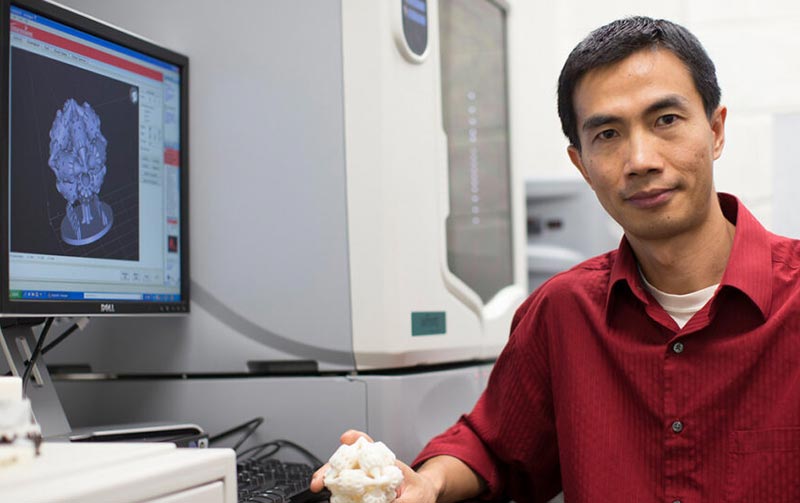
In the past 90 years, the University of Tennessee Research Foundation has worked with inventors across the UT System who consistently find new ways to apply their work to real-world situations. One of these researchers, Xueping Li, enjoys tackling seemingly unsolvable problems and collaborating with other departments to create cutting-edge solutions.
Li is a Professor and Dan Doulet Faculty Fellow in the Department of Industrial and Systems Engineering at the University of Tennessee, Knoxville. He also serves as Co-Director of the Health Innovation Technology and Simulation (HITS) Lab and Director of the Ideation Laboratory (iLab). In the simplest terms, he describes his work as “making things better, whether that is a product, process or system.” His research focuses on complex system modeling, simulation, and optimization with broad applications.

Li’s commitment to commercialization is impressive. He has filed 13 disclosures with UTRF, has one registered copyright, and has been awarded four Maturation Grants to support his work. He is excited about continued collaborations with UTRF on new technologies resulting from current artificial intelligence and decarbonization projects. His vision includes fostering multidisciplinary partnerships to address increasingly complex challenges.
When you bring your technology to people’s hands and have them use it, it’s really fulfilling,” he said. “It’s a different kind of satisfaction than a paper being published.”
Through the HITS Lab and other projects, Li collaborates with researchers and departments to apply his work in various fields, including supply chain logistics, healthcare, and energy systems.
It’s not just me. I have a whole team of collaborators. For example, my long-time collaborators, Tami Wyatt and Tom Berg of the College of Nursing, and Bing Yao from my department,” said Li. “It’s really a team effort. There are so many people involved.”
A poignant example of this collaboration is Li’s previous work with Wyatt, Matt Bell and Yo Indranoi to create iCare. This educational software program integrates electronic health records (EHR) into a simulated student learning tool. Global information services company Wolters Kluwer purchased the technology in 2011 and rebranded it as DocuCare. According to the company, the program is a leading academic EHR training solution used at hundreds of universities worldwide.
UTRF has had a long, fruitful relationship with Xueping Li. He develops solutions and truly seeks to understand the needs of the customers and end users,” said Gregory Sechrist, technology manager at UTRF’s Multi-Campus Office. “Focusing on innovation, Li and his team are always on the lookout for new problems to tackle.”
Li’s accomplishments aren’t only recognized within the university system. Numerous industry partners and federal agencies have sponsored his research, including the National Science Foundation, the National Institutes of Health, the Department of Energy and the Health Resources and Services Administration. Last year, the Institute of Industrial Systems Engineers awarded Li the prestigious Fellow Award. He is incredibly honored to receive this distinction.
Reflecting on what he hopes to accomplish with his work long-term, he hopes to make tangible, real-world changes and support his students and junior faculty members.
I want to solve problems. To that extent, I think most of our work comes from the end users,” he said. “Hopefully, we can make a difference—even a tiny one. For me, the most important thing I can do is to impact lives.”
His advice for the future generations of researchers? Technology innovation can be challenging and requires patience.
It takes lots of time and effort. But start with the basics and the fundamentals and do good work. Good things will happen, but it takes time,” he said.